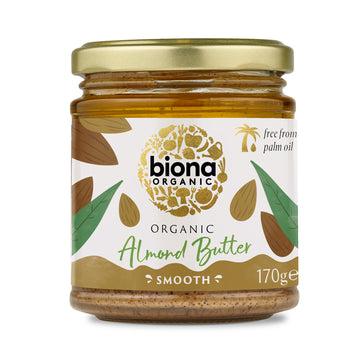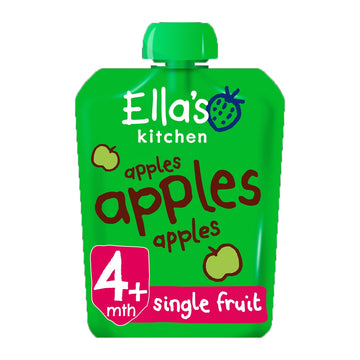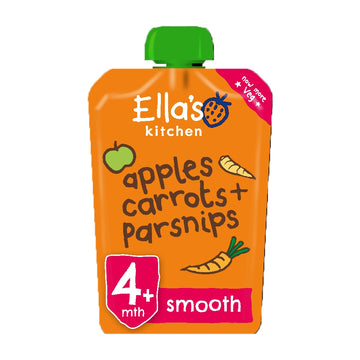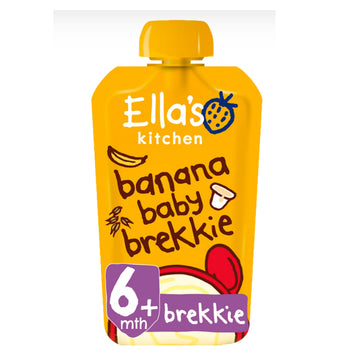Starting a baby on solid foods is an exciting, busy and very messy stage! It can also be dauting trying to know where to start (a quick google and you're inundated with recipes and advice). Weaning typically happens around the 6 month mark and when it comes to baby's first foods, it's easiest and best to keep things simple. Here are some of the best first foods for baby to get you started!
Best First Foods for Baby
The focus during a baby’s first year of life should be on learning how to eat rather than what to eat. While the quality of foods offered is vital for baby’s health, try to avoid getting worried about quantities or what may seem like taste dislikes at this stage.
Focus on lots of variety, starting smooth and getting progressively more textured until baby can cope with eating the same meals as the whole family. As long as those meals are mostly home cooked, and low in salt, your little one should be eating the same as the whole gang before the first birthday. Here are some of the best first foods for baby.
Banana
Nutrient packed, perfectly packaged and needs no cooking - just mash and go! This is a staple in any busy parent’s repertoire and luckily babies tend to love it.
For variety add some blueberries, mix with yoghurt or spread on toast once the baby is old enough for finger foods!
Avocado
Avocado is one of the best first foods for baby. Avocado has all the convenience qualities of a banana and is a great source of healthy fats. In fact, the two are delicious mashed together.
Babies will quickly progress to chewing on a finger of toast or rusk. This encourages the chewing muscles and can ease tender gums. Do be careful to always supervise a baby’s eating especially when offering ‘finger foods’ that they can pick up and eat themselves.
Nut Butter on Toast
Nut butter with toast is a great option for baby's first foods. Adding toppings to wholemeal toast will increase the nutritional content and keep them occupied during a spoon feed.
Smooth nut butters (try brands with no added sugar or salt) are ideal. New research is encouraging parents to introduce potential allergens earlier and repeatedly during the introduction of solids. You can also pop some cheese on toast and melt as another handy option.
Scrambled Egg
Egg is a perfect quick meal, add a splash of milk, a small knob of butter or oil to cook, handful of grated cheese and even a little pepper. It's amazing how sophisticated baby’s tastes can be. Make sure for young babies to cook the egg completely – this will only take moments in a pan or even the microwave. If it is a little grainy, thin with milk. It is a good way of introducing soft texture in the diet.
Frozen Fruit & Veg are your Friend
We all have aspirations to fill our freezers with homemade organic portions of baby food but the reality of busy lives may not always allow for this. However the freezer can be stocked with good quality frozen fruit or veg that can be easily be cooked, whizzed in the blender or mashed and added to babies meals. Think frozen peas, corn, carrots.
Frozen fruit such as blueberries, raspberries and mango allow the goodness of these seasonal fruits year round. A few seconds in the microwave and they can be added to yoghurt, banana or given as finger foods.
Baby Smoothies
As an extension of this idea, ‘baby smoothies’ can be made in seconds and frozen in small pots. Add banana, yoghurt, frozen berries/ripe fruit and a handful of oats to a blender – thin out with a little water if needed or leave fairly lumpy for ease of spoon feeding.
Fish
Not everyone’s cup of tea but a favourite of babies. Fish is the perfect fast food, it can be microwaved with a spoon of milk in less than a minute. The likes of salmon, cod and haddock all work perfectly. It then flakes and mashes easily and can be mixed with pasta, rice, potatoes and veg... blend or mash as needed depending on the baby's age.
Low Salt Stock Cubes
Look for low salt stock cubes in your health food shop. They are ideal for making one pot dinners. Simply simmer chicken and vegetables such carrots, parsnips or peas in the stock. For added nutrition, add a handful of quick cook grains such as quinoa, couscous or barley to the pot and blend or mash the results. Freeze in portions for another day.
Porridge
Porridge makes an ideal baby breakfast. The leftovers can be used to make a handy baby snack. In a small roasting dish, bake leftover porridge mixed with some grated apple, raisins and a pinch of cinnamon in a moderate oven until firm. Cut into hand sized chunks for a healthy finger food.
Sweet Potato
Another one of the best first foods for baby has to be sweet potato. This is a baby favourite. Sweet potato can be quickly roasted as cubes or crisps and stored as a finger food. It's high in Vitamin C, beta-carotene, B vitamins and fibre.
Natural Yoghurt
Keep a tub of whole fat natural yoghurt (ideally with added Vitamin D) in the fridge. Stir in fruit for an extra treat. It's also a lot less expensive than individual ‘baby’ yoghurts.
Dried Fruit
Dried fruit is a great addition to yoghurt! Simmer raisins, dried apricots or prunes for a couple of minutes in a little water. Blend and freeze in small portions. This will defrost quickly in the microwave and can be added to yoghurt or breakfast cereal. This ideal if baby becomes a little constipated from time to time.
Fresh Fruit
Grate a handful of apple or cheese onto the highchair tray. This will keep baby’s hands busy while spoon feeding. Graduate to blueberries and smaller (squishy) items as the pincher grip develops.
Tips to Help You on Your Weaning Journey
On the Go
There are also lots of commercial baby foods available for times when you're on the go like pouches. They can often be popped in a bowl and eaten as is! Look for organic where possible and avoid added sugar or salt.
Make Extra
When cooking family meals, get into the habit of putting on a little extra veg or saving leftover potato, pasta or rice to blend or mash into babies next meal. Ideally remove a portion from the pot before too much salt or spice is added until baby’s palate matures.
Get them involved
Finally, a little independence goes a long way. It's messy business but allow a baby to get involved when eating. For instance, let them put their hands in the bowl, hold a second spoon, sip from an open cup (start with a little water) and use finger foods. In time it will lead to baby learning to ‘self feed’ more quickly, and reducing the mess in the long run!
Checked and updated: 8 September 2021

















